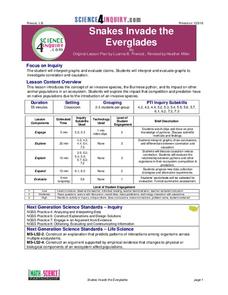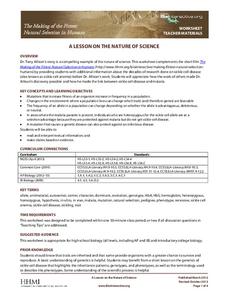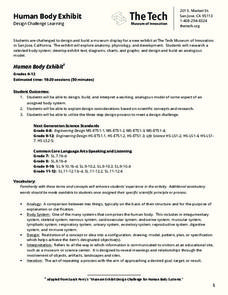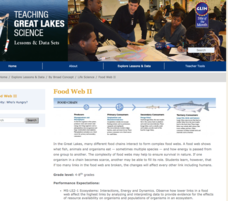Science 4 Inquiry
Snakes in the Everglades
The Burmese python is on the loose ... and he's hungry! Illustrate the differences between causative and correlative relationships through an inquiry instructional activity. Pupils examine several sources of information to determine if...
Howard Hughes Medical Institute
Modeling Trophic Cascades
In the ecological game of who eats who, one small change can have a big impact! Individuals create food chains in an array of ecosystems, then determine what happens to organisms in the chain when one organism changes its feeding...
Howard Hughes Medical Institute
Niche Partitioning Activity
Dinnertime on the African savanna is a highly choreographed event! Introduce young ecologists to the concept of niche partitioning through a hands-on activity. Pupils research animal behaviors and use data to develop an understanding of...
Howard Hughes Medical Institute
Ocean Acidification
Human impacts on the environment can sometimes be difficult to measure, especially under water! An activity centered on ocean acidification gives science scholars the opportunity to examine the effects of carbon dioxide on marine life....
Curated OER
Moebius Strips
Students make Moebius strips and use them to demonstrate the interconnectedness of an environment. They explore the natural cycles (water, oxygen/carbon dioxide, carbon, nitrogen) within the environment. They describe how the cycles are...
Curated OER
Watch the Road Signs
What makes a good speaker? Upper elementary learners practice oral fluency by working with a partner to read nonfiction books. While reading, they practice using correct tone of voice, making eye contact, and speaking clearly.
Curated OER
On the Road Again
Young scholars read to their peers from selected texts. As one person reads, the other person listens to his/her peer, noting tone and fluency. Afterward, they reflect on each other's reading. There is a guided reflection worksheet...
Howard Hughes Medical Institute
A Lesson on the Nature of Science
If you are looking for a great way to present natural selection in humans, look no further. This handout is intended to accompany the 14-minute video The Making of the Fittest: Natural Selection in Humans, which can be found on the...
Curated OER
Acid Rain
Create a simulation of acid rain in your classroom with lemon juice and bean plants to help kids study the effects of pollution on plants. In addition, learners will listen to a story and write responses based on guiding questions.
Global Oneness Project
Deconstructing Consumerism
To increase awareness and launch a discussion of consumerism, class members view What Would It Look Like, a 25 minute film of images that capture the global effects of the consumption of goods. Viewers make a list of the images that they...
Tech Museum of Innovation
Human Body Exhibit
Explore human anatomy and physiology using models. Scholars study systems of the human body and design a display for a museum exhibit. To complete the activity, individuals create analogous models of their chosen human body systems.
University of Minnesota
What's the Deal? Addiction Card Game
Addiction is a big deal! Playing a game of cards helps learners understand the concept of addiction. Through their analysis, they examine the potential for addiction and how it varies for each individual.
Channel Islands Film
Once Upon a Time (Sa Hi Pa Ca): Lesson Plan 3
What was the most significant tool used by the Chumash? How did the environment make the tool possible? What group behaviors allowed the Chumash be be successful for thousands of years? After watching West of the West's documentary Once...
Howard Hughes Medical Institute
Tracking Genetically Modified Mosquitoes
What's that buzzing in your ear? An insightful lesson about genetically modified mosquitoes! Partnered pupils explore the creation, release, and monitoring of mosquitoes designed to reduce the mosquito population. After watching a video,...
Howard Hughes Medical Institute
Seed Dispersal in Tropical Forests
How do seeds get around? It's not like plants can control seed dispersal—or can they? Dig deeper into the amazing mechanisms of seed dispersal observed in tropical plants through interactives, a video, and plenty of hands-on data...
Serendip
Photosynthesis and Cellular Respiration
How does energy from the sun make plants grow? Scholars move step by step through the processes that promote plant propagation during a detailed lesson. The resource illustrates ADP production and hydrolysis, then allows learners to...
National Park Service
The Young Naturalist
Beginning with a brief history of our 26th president, Theodore Roosevelt, then followed by a discussion of his interest in nature, young scientists take to the outdoors to locate and observe local plants and insects. Scholars return to...
Howard Hughes Medical Institute
Lactose Intolerance: Fact or Fiction
Around the world, about 2/3 of adult humans are lactose intolerant. Scholars work in small groups to discuss a few statements about lactose intolerance. Then, they watch a video on the topic and readdress each statement. Whole-class...
Curated OER
Elephant Seals - Evolution
Students create posters or skits based on specific adaptive characteristics of elephant seals.
Curated OER
Reaching Your Destinations
Individuals will read their chosen instructional text aloud to their classmates. Intended to build reading fluency and confidence, this lesson presents a basic presentation project. There are no instructional texts attached or suggested...
Curated OER
Alcoholic Fermentation in Yeast
Biology learners investigate the effect of sucrose concentration on yeast alcoholic fermentation. During the lesson,they compare and contrast the processes of cellular respiration and alcoholic fermentation. They design an experiment to...
Michigan Sea Grant
Food Chains and Webs
Starting with a simple food chain, young scientists interpret the difference and interrelatedness between herbivores, carnivores and producers. They answer questions related to cause and effect of food chain disruptions, including the...
Michigan Sea Grant
Food Web II
A food web consists of complex food chains and the more complex the web, the better likelihood of survival. Learners compare and contrast food webs and food chains and discuss concepts like the predator-prey and consumer-producer...
Michigan Sea Grant
Invasive Species
Learners identify invasive species to the Great Lakes and analyze their impact on the ecosystem. Using photo cards with pictures and facts, young scientists work in small groups to match invasive species with their corresponding...

























